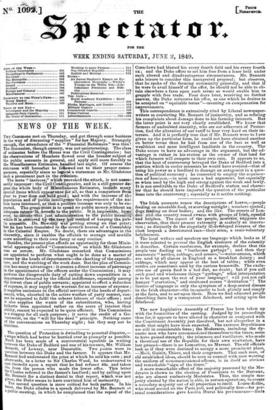The question of Protection is dwindling to personal disputes,— a
stage which had better be hurried over as promptly as possible. Much has been made of a controversial squabble in writing between the Duke of Bedford and one of his tenants, Mr. William Bennett, of Lewsey, near Dunstable. Two points were in question between the.Duke and the farmer. It appears that Mr. Bennett had understated the price at which he sold his corn ; and afterwards, in a letter to Sir Charles Wood, he endeavoured to cast discredit upon a report that he had refused 46s. and taken 50s. from the person who made the lower offer. This letter te Charles referred to the farmer's landlord ; and by calling upon r. Bennett for a distinct denial to that report,. which was not given, the Duke seems to have convicted him of insincerity.
The second question is more critical for both parties. In his letter, the Duke alludes to a speech delivered by Mr. Bennett at a public meeting, in which he complained that the repeal of the Corn-laws had blasted his every fourth field and his every fourth oz; and the Duke offers to set him free from a lease held under such altered and disadvantageous circumstances. Mr. Bennett asks leisure to consider this unexpected proposal; but observes, that he spoke of the farming community generally, and that if he were to avail himself of the offer, he should not be able to ob- tain elsewhere a farm upon such terms as would enable him to grapple with free trade. Four days later, receiving no further answer, the Duke reiterates his offer, as one which he desires to be accepted on " equitable terms "—meaning on compensation for improvements.
This correspondence is extensively cited by Liberal newspaper- writers as convicting Mr. Bennett of insincerity, and as refuting his complaints about damage done to his farming interests. But the latter point is not very clearly established. We know that farmers of undoubted sincerity, who are not adherents of Protec- tion, find the alteration of our tariff to bear very hard on their in- terests. And it is perfectly true that if Mr. Bennett were to have given up the particular farm, he could not have obtained another on better terms than he had from one of the best as well as wealthiest and most intelligent landlords in the country. The Duke seems to have an advantage in the argument, but the ad- vantage is rather in his station as the owner of that land for which farmers will compete to their own ruin. It appears to us, that the heat of controversy betrayed the Duke of Bedford into a position which in cooler moments he would have avoided—that of using his power as a landlord to damage an antagonist in a ques- tion of political economy ; he consented to employ the argunien- tun ad hominem,—in most cases a bad argument, but especially so when used by the high and strong against the weak and lowly. It is not creditable to the Duke of Bedford's station and charac- ter that he should have imported the question of the particular lease into the controversy ; especially as it settles nothing.


























